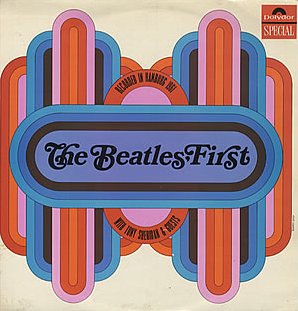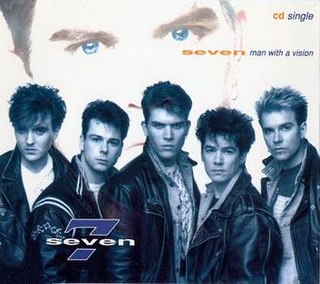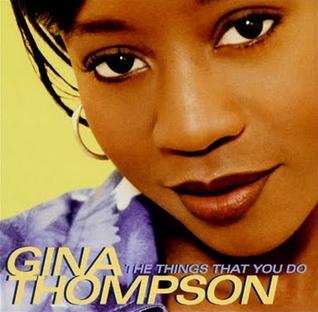
Brave is the seventh studio album by Marillion, released in 1994. It charted at number 10 on the UK Albums Chart, being the last of the band's albums to reach the Top 10 in the United Kingdom until F E A R reached number 4 in 2016.

The Beatles' First! is a German compilation album of songs recorded in Hamburg in 1961 and 1962 by Tony Sheridan with the Beatles as his backing group. It was originally released in 1964 in Germany, then issued in 1967 in England, 1969 in Canada and finally in the United States in 1970.
"The Long Goodbye" is a song written by Irish singer-songwriters Paul Brady and Ronan Keating for Brady's 2000 album Oh What a World. In October 2001, it was released by American country music duo Brooks & Dunn as the third single from their album Steers & Stripes. Ronan Keating released his version in April 2003 as the last single from his album Destination (2002).

"Love Glove" is a single by the British pop group Visage, released on Polydor Records in August 1984. It was the first single to be released from Visage's third album, Beat Boy, and peaked at #54 on the UK Singles Chart.

"The Flame" is a power ballad written by British songwriters Bob Mitchell and Nick Graham. The song was released in 1988 by the American rock band Cheap Trick and the first single from their tenth album Lap of Luxury.

Under a Raging Moon is the sixth solo studio album by English singer Roger Daltrey, released in September 1985 by Atlantic Records. The album reached No. 42 on the US charts, and the single "After the Fire", written by Pete Townshend, reached No. 48. It includes a tribute to Keith Moon, former drummer of the Who who died in 1978, on the track "Under a Raging Moon". In Canada, the album reached No. 33 on the RPM Magazine charts, and "After the Fire" reached No. 53.
Andrew Gerard Hill is an English record producer and songwriter who worked with Bucks Fizz and Celine Dion during the 1980s and 1990s.

"You Can Leave Your Hat On" is a song written by Randy Newman and appearing on his 1972 album Sail Away.

Seven is an English AOR band formed in Bournemouth in the 1990s, who recorded two singles with Polydor Records both having minor success within the UK. In 2014 a tribute album of the original unreleased material was released to critical acclaim, followed two years later by a studio album of new material.

"Take Out Some Insurance" is a blues song released in 1959 by Jimmy Reed written by Charles Singleton and Waldenese Hall but originally credited to Jesse Stone. The copyright registration for the song lists its title as "Take Out Some Insurance on Me, Baby".. Tony Sheridan recorded it with different lyrics in 1961 with The Beatles as his backing band. Misidentified, it was released in Germany in 1964 as "If You Love Me, Baby " but subsequently as "Take Out Some Insurance on Me, Baby ", "Take Out Some Insurance on Me, Baby" or erroneously as "If You Love Me, Baby".

"Where Has Love Gone?" is a song by British singer-songwriter Holly Johnson, released in 1990 as the lead single from his second studio album Dreams That Money Can't Buy (1991). The song was written by Johnson and produced by Andy Richards.

"Can't Stop Fallin' into Love" is a song by the American rock band Cheap Trick, which was released in 1990 as the lead single from their eleventh studio album Busted. It was written by guitarist Rick Nielsen, lead singer Robin Zander and bassist Tom Petersson, and produced by Richie Zito.
"Tomorrow" is a song by French singer Amanda Lear from her 1977 album I Am a Photograph, released as a single the same year. The song was a commercial success and remains one of Lear's biggest hits.

"Man With a Vision" is a song written by John Parr, Keith McFarlane and Simon LeFevre, which was first recorded and released by Seven as their second non-album single in 1990. Parr later released his own version as the title track to his 1992 album.

"Wherever Would I Be" is a song by American rock band Cheap Trick, released in 1990 as the second single from their eleventh studio album Busted. It was written by American songwriter Diane Warren and produced by Richie Zito. "Wherever Would I Be" peaked at number 50 on the US Billboard Hot 100.

"It's Only Love" is a song by American rock band Cheap Trick, which was released in 1986 as the lead single from their ninth studio album The Doctor. It was written by guitarist Rick Nielsen and lead vocalist Robin Zander, and produced by Tony Platt. The song failed to chart in the US. Despite the commercial failure of the song, the music video is notable for the use of American Sign Language.

"The Things That You Do" is a song performed by American R&B singer Gina Thompson from her debut album, Nobody Does It Better (1996). The single version was released as the Bad Boy Remix featuring Missy Elliott, who gained notability and mainstream attention for her unique signature, "Hee-Hee-How" punchline. Elliott's contribution managed to help the single crack the top 20 on Billboard's Hot R&B/Hip-Hop Songs chart, where it peaked at #12 and spent a total of 29 weeks. The song also appeared on the US Billboard Hot 100 chart, where it peaked at #41.

"The Gap" is a song by the British pop group Thompson Twins. It was the title track from the group's 1984 album Into the Gap, and was also released as a single in certain countries though not in the group's native UK. The single peaked at #69 in the U.S., spending six weeks on the US Billboard 100. It also charted in Germany where it peaked at #62. There was no promotional music video for this single.

"Didn't Know I Had It" is a song by American rock band Cheap Trick, released in 1994 as the fifth and final single from their twelfth studio album Woke Up with a Monster. It was written by Rick Nielsen and Todd Cerney, and produced by Ted Templeman.

"Blame It on the Radio" is a song by English singer/musician John Parr, released in 1986 as the lead single from his second studio album Running the Endless Mile. It was written and produced by Parr, and reached No. 88 on the US Billboard Hot 100. It remained on the charts for six weeks and became Parr's last entry on the chart.

















